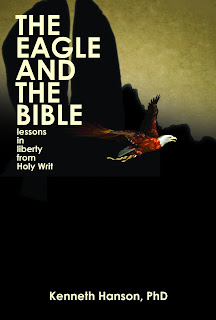As I’m now engaged in teaching a summer course on the Hebrew Scriptures, I can’t help but reflect – this being Memorial Day – that the distinguished Founders weren’t only indebted to the likes of Montesquieu, Locke, Burke and others for their political theory, but (believe it or not) to the Bible. The “Good Book,” they were convinced, would help them escape the endless pitfalls of governing. Remember the prophet Samuel, who warned the Israelites of the dangers of asking for a king? Didn’t the Scriptures envision an early form of “checks and balances” to prevent one form of tyranny or another from gaining the upper hand? The king wasn’t allowed to rule in an unfettered manner; he was to be “checked” by priests and prophets, whose job it was to hold him accountable to a higher authority, who could and frequently did put him in his royal place. The Bible, it seems, isn’t just a book of high-minded religiosity. It puts forth the very political ideas that came to be part of our own republic!
Monday, May 28, 2012
Sunday, May 27, 2012
Libertarian Musings on Memorial Day Weekend/ Shavuot
It’s definitely appropriate to reflect on “freedom” on Memorial Day. But let’s recognize at the outset that freedom, far from being something we yawn about in a musty old history book, is by nature more than a tad … SUBVERSIVE. America’s Founders were, as we know, students of the Bible … but not just as traditional religionists, who politely bowed their heads as they listened to Sunday sermons. They were rebels with a cause – freedom from British tyranny – and they looked for political lessons in every page of holy writ. The fact that quite a number of them were in full rebellion against religious authority (many being Deists, Unitarians, and members of disparate sects – Quakers, Separatists and the like) enabled them to look at Scripture with a critical eye, not just swallow what their clergymen told them. That “rebellious” attitude is what got them over here to begin with, and it further informed their entire philosophy of government (hence the First Amendment). It also helped birth a revolution.
Thursday, March 29, 2012
The Bible is … Political!
I was musing with my class today: What a pity, that people compartmentalize their lives into little boxes; and they have this box called “religion,” into which they stick the Bible and whatever sanctimonious prattle they imagine goes along with it. So, the Bible gets read purely as a “religious” book, even though relatively little of it has to do with what modern folk think of as “theology.” Rather, it’s about human behavior, ethics, justice, a whole lot of law, and … politics!
That’s the theme and message of my new (and 6th) book, The Eagle and the Bible. The Good Book is really “good politics”! Furthermore, we can find endless parallels between the stories recounted in its narratives and the American experience, especially the struggle against tyrannical government. I’ve in fact isolated a political, “revolutionary” current – anti-establishment and anti-big government – in Holy Writ that’s as deliciously “subversive” today as it was back in the days of David, Solomon, and yes, Moses. Were these heroes of the Bible the great religious leaders they are made out to be, or were they much closer to biblical “tyrants,” opposed by a good many of the Israelites themselves? Here’s a book that dares to question traditional interpretations, not to cast doubt on the Bible, but to demonstrate just how relevant it is to the greater debate today, when so many feel that government is basically out of control, and cannot be trusted.
The great divide over the role of government is certainly not foreign to American history. But how many people, when they read the Bible, also recognize the “great divide” between those Israelites who favored an all-powerful central government, and those who favored a loose “confederation” of tribes? Is that any different from the debates in early America between the Federalists (Alexander Hamilton, John Adams and others), who preferred strong central authority, and the Anti-Federalists (Patrick Henry, Thomas Paine, Samuel Adams and Thomas Jefferson), who advanced the cause of “states rights”? In ancient Israel, the issue was “tribes rights,” and in both cases the end result was civil war.
My goal is to stir up a whole new respect for the Bible, as a masterful political work, that can tutor us through the great issues of the day, if we’re bold enough to peek beneath the surface and seek out the political conflict that underlies the whole narrative. As I tell my students: Conflict drives everything!
Thursday, November 24, 2011
Of Pilgrims, Patriarchs, and Politics
Whatever the reason the great biblical patriarch Abraham left this storied land, there’s a pattern to be discerned in his narrative that wasn’t lost on the “patriarchs” of early America, who not only devoured the Bible, but were intent on making it part of their personal experience. We know them as the “Pilgrims,” who sadly have been reduced to little more than caricatures in children’s books.
These “Pilgrims,” as we know them, were people of extraordinary faith. It’s rather difficult in our own day to imagine that people might really be motivated to do extraordinary things by pure faith, but such were the Pilgrims. It was their powerful piety that led them to withdraw from the religious structure of their European land – the Church of England. Originally part of a larger movement known as the Separatists, they incurred the wrath of Britain’s King James I, who expected strict obedience from his subjects and condemned them as fanatics. Their first move involved crossing the Channel to the Netherlands, taking refuge in Amsterdam and subsequently Leiden. Holland was their equivalent of the ancient city of Haran, Abram’s midpoint on his long trek out of Mesopotamia.
Such parallels weren’t lost on the likes of William Bradford, who later became governor of this rag-tag group and recorded their adventures in an illustrious memoir, Of Plymouth Plantation. Of their desperate crossing for the New World, undertook in September, 1620, he wrote: “They knew they were pilgrims, and looked not much on those pleasant things they were leaving, but lifted up their eyes to the heavens, their dearest country, and quieted their spirits.” Whereas Abraham followed the desert trade routes of the ancient tribal nation called the Amorites, the Pilgrims navigated the sea routes of English colonists. Theirs was as much a voyage into the unknown as was that of the first biblical Patriarch, who knew nothing of his future “promised land.”
Thursday, October 6, 2011
Steve Jobs: In Memoriam
The first time I encountered a Mac was back in the 80s, in grad school, studying an "obscure" discipline that everybody said was sure to keep me "hungry" for life. I was "hungry and foolish," but I managed to scrape together enough to buy my first Mac, with a "huge," 20 megabyte built-in hard disk. Writing my doctoral dissertation on it, I was hooked. Over 2 decades and 5 books later (all written on Macs), my life revolves around products that Steve pioneered. As a professor at a major university, I talk endlessly to my students about the world of Apple, and I've probably sold a few over the years. The least I could do for the best computer/ hi-tech company on the planet. We'll miss you, Steve!
Saturday, September 24, 2011
Israel’s Fault?
Having lived in Israel for years, learned the national language – Hebrew – and spent the better part of my life “supporting” the Jewish state, I can’t imagine I’m about to say that when it comes to the country’s current beleaguered situation, Israel has, quite arguably, done this to itself! “Back in the day,” I remember when a young aspiring Israeli leader named Benjamin Netanyahu declared that an independent Palestinian state is out of the question. There just isn’t room in this tiny region, a scant 50 miles across, for two independent nations. Nor is this Switzerland, where folks of French and German stock have learned to just “get along.” Mr. Netanyahu – Bibi – used to say, “This isn’t a peace process; it’s a war process.” To that he added, “The Palestinians don’t want a peace with Israel; they want a piece of Israel.” Moreover, Israel needs the territories it conquered in the 1967 Six Day War in order to protect itself from existential threats. It needs the strategic Jordan Valley as a buffer zone against attack from the east. And it can by no means allow a hostile Palestinian state to exist just a few miles from its largest city, Tel-Aviv, and occupying the eastern half of its capital, Jerusalem.
Saturday, September 17, 2011
The Libertarian’s Bible
All right; it’s time for some political musings!... from a "Libertarian" perspective...
What do we think of when we think of the Bible? The “Good Book.” A book of Faith. The Word of God. All very nice designations. But how often to we dare to think of the Bible as a book of politics? Doesn’t the Bible engender enough religious disputes without throwing politics into the mix? But what if the Bible actually weighs in on political issues and principles relevant to our own times? What if it teaches valuable political lessons that we can’t afford to miss?
Subscribe to:
Posts (Atom)





